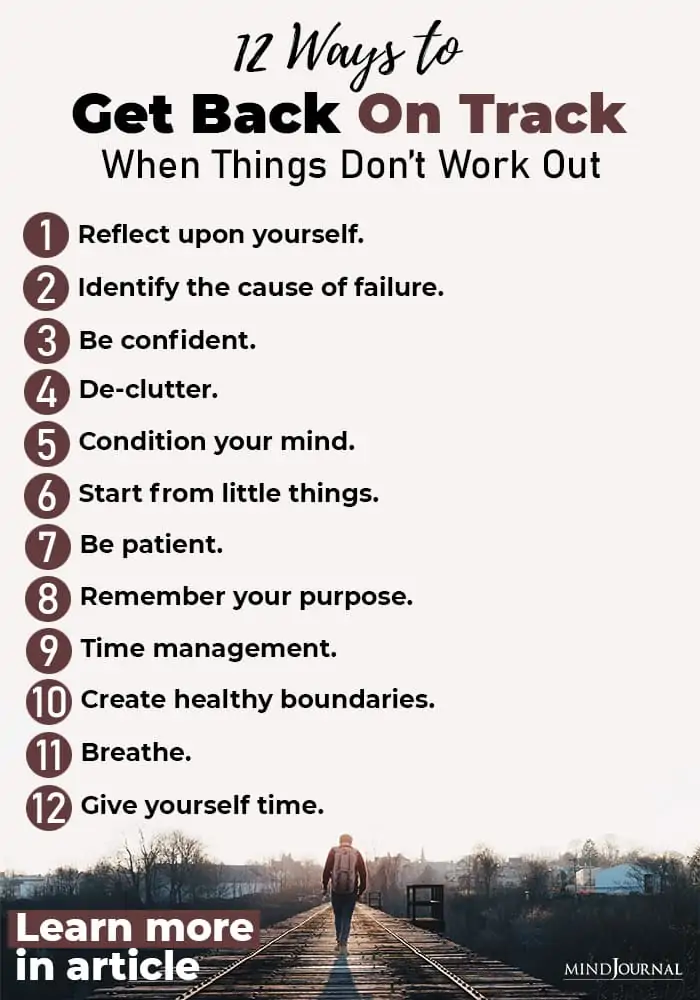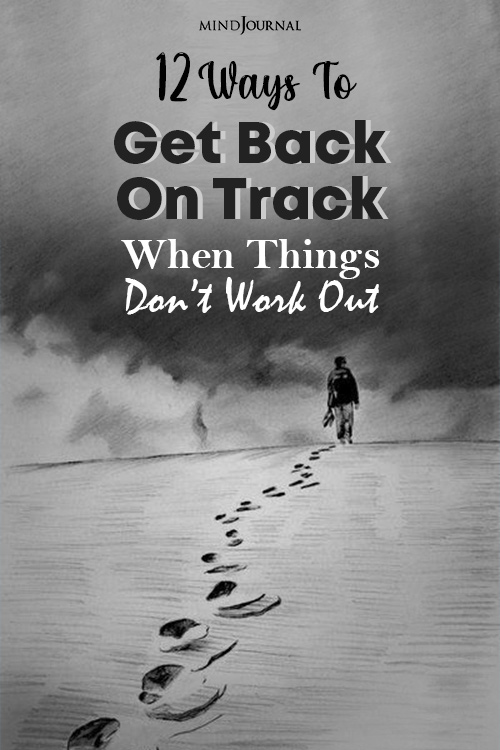Whenever you feel like you are stuck in a rut, instead of beating yourself up and thinking that there’s no way you will be able to come out of it, try to be optimistic, take control of your life, and get back on track.
Life can be complicated. A few months ago, you felt like you were being extremely productive. You would visit the gym regularly, stick to your healthy eating habits, make achievements at your workplace, and were even getting quality sleep each night. You felt motivated enough to take on any task that came your way and even executed it to perfection.
But all of a sudden, everything is dull and bleak. You got too tired of the hectic schedule and you slipped, making you go down a rabbit hole of demotivation and procrastination. Maybe you suffered from the loss of a relationship, an illness, an injury, or a significant setback. Now, you only find yourself thinking negatively because you feel as though all the progress you had made is now ruined.
However, when things don’t work out, there are things you could do to get your life back on track. Many religions and traditions state that in the end, you will be happy. If you aren’t happy, then it is not the end.
But how does one find the motivation to start all over again when things don’t work out? Simple: you go back to the basics.
What Is Control?
When things don’t work out, the first thought that comes to mind is how to begin from scratch. But before you start figuring that out, it is important to know what control is.
Does control mean having a good work-life balance? Or does control refer to being a quick decision-maker?
The thing is that control can be subjective. Having ‘control’ over your life is important, but it may not always mean the same thing for two different people.
Taking control of your life means that you are self-aware and confident enough to embark on new journeys. This control allows you to feel motivated enough to believe that if you invest your hard work into something, you will reap great results.
While it is impossible to control all the external factors around you, it is possible to control how you feel about them. Taking control of your life begins with your thoughts and emotions—internal factors—which later translate into controlling your surroundings or external factors as well.
When things don’t work out according to plan, we feel as if everything is out of control. To avoid this, we must remember that taking control is a choice that we make for ourselves and that we can exercise that control over our lives whenever and however we wish.
Related: 4 Life-changing lessons I Wish I Knew When I Was Younger
12 Ways Of Gaining Control When Things Don’t Work Out

So, what do you do when things don’t work out and you feel as though you have lost control? You gain it back.
Here are 12 simple ways you can get your life back on track.
1. Reflect upon yourself.
A thorough life audit can clear your perspective. Since it enables you to focus on each area of your life separately, it gives you a better picture of where you stand at the moment. While you reflect upon your life, remember to include aspects such as your career, relationships, family, psychological and physical health, fitness, and overall motivation.
This gives you more clarity regarding where you are and where you want to be in the future.
While you could carry out this reflection yourself, there are also many tools available to aid you in this life audit process. The Wheel of Life focuses on a diagram method to evaluate your life, but there are also multiple different lists of questions available to assess your situation.
2. Identify the cause of failure.
You had your life right on track—then what happened? Before you restart your pursuit of motivation and productivity, you must identify the cause of what led to your downfall in the first place. This serves as an extremely important factor in the healing process, especially to ensure that you don’t repeat the same mistakes.
If you dig deep enough, you will find that some common triggers led to your spiral of negativity. Once you reflect on these triggers and what causes them, avoiding them becomes much easier. This way, you can easily get your life back on track when things don’t work out perfectly.
3. Be confident.
Confidence is the key to your success, especially when it comes to having control over your life. While showing up for work every day is important, showing up to achieve something is much more important.
When things don’t work out perfectly and continue to spread far beyond your control, it can be because of your lack of physical and mental confidence. To regain your confidence, think about the things that provide you with the most confidence and engage in habits that correlate to that. For instance, if you feel confident when you are physically healthy, go to the gym to retain your fitness.
4. De-clutter.
For a clear mind, you must have a clear plan. On average, every individual has around 70,000 thoughts per day. While it is impossible to keep a close record of every single one, it is highly recommended to list down some of the thoughts that are most important to you.
This may be a thought about cooking pasta for dinner tomorrow or that work meeting you have been constantly rescheduling. Maybe it is a project idea you had right before you went to sleep, or maybe it is about that old friend that you thought of while you sip your coffee.
This method of brain dumping will help you bring important ideas and tasks onto paper while making room for your mind to focus on each item individually.
Related: 11 Limiting Beliefs That Are Holding You Back In Life
5. Condition your mind.
When things don’t work out, you may think that you need to start building your good habits back again from scratch. However, that is not true.
There are many habits and routines that one follows subconsciously—and you can easily make use of your current habits to restart different sorts of healthy behavior to gain control over your life again.
For instance, if your current routine is to come home from work, change into comfortable clothing, and watch Netflix—you can use that to condition your brain into a new habit. By changing into workout clothes instead, you may be motivated enough to head to the gym before getting to that TV series.
6. Start from little things.
Each droplet makes an ocean. When things don’t work out optimally in life, remember that you still have control over the tiny little things that are around you. This could be as insignificant as organizing your drawer or cleaning your house—but it will surely help you regain control over your life.
Remember that even tiny things can accumulate into massive life-changing momentum.
7. Be patient.
When things don’t work out, it can be very tempting to get back on track as soon as possible. As a result, you may find yourself rushing through everything and trying to do too much too fast. However, it is time to slow down and be patient with yourself.
If you have lost control over your diet, it is easier to get back on track by starting to track calories again instead of meal prep and strict diets.
8. Remember your purpose.
Self-awareness is necessary. To regain control over your life after you have slipped once, you need to take a step back and reflect upon the purpose of why you wanted control in the first place. Even in the harshest of weather, trees still standstill. This is because they have strong roots—or a strong purpose.
Magical sayings are essential for reminding yourself that even if you don’t know how what you’re hoping for will appear in your life, everything is possible—something that can be easily forgotten when things are not working out.
When things don’t work out perfectly, go back to finding your purpose and why you started. Let that bring you back to gaining control over your life.
9. Time management.
This is an important life skill that takes years to master but is necessary for getting your life back on track. One of the possible reasons why you slipped in the first place could be because you were too overwhelmed by your surroundings. If there are too many things on your mind at once, you are subject to a mental breakdown sooner or later.
To avoid that, you need to focus on managing your time more efficiently and stressing yourself out less. While it is okay to engage in multiple projects, remember to be moderate with rationing your time, and be responsible enough to keep some time for yourself as well.
Related: Staying Calm in the Midst of Chaos
10. Create healthy boundaries.
Regaining control over your life requires you to prioritize the things that are most important to you and discard the few that only stress you out. To do this effectively, it is recommended to set healthy boundaries around yourself that help you focus solely on the important things in life.
11. Breathe.
When things don’t work out, it is okay to feel overwhelmed. One of the easiest ways to relax is by taking a long walk and reconnecting with the outdoors. Don’t focus on your speed, distance, or surroundings—just breathe and focus on yourself for this moment.
12. Give yourself time.
When things don’t work out and you spiral down that hole of negativity, you could be quick to start blaming yourself for everything. As a result, you may also feel pressured to get back on track immediately.
However, you need to give yourself time. Healthy routines are built through consistency and patience, constant reevaluations, and learning how to do things differently. Since this process may take time, you need to be kind to yourself.
Final Thoughts
While there is no single solution to getting your life back on track immediately, you should know that there are multiple smaller steps you can take towards achieving your ultimate goal. Just follow these 12 ways of gaining control when things don’t work out, and you will eventually feel the improvement in your quality of life. After all, having control over our lives is the key to feeling content.
‘Doron Hafner is a personal and business coach, writing mostly for Vision, Belief, Change that inspires people to live the life they want, through opening their minds to new perspectives and possibilities.‘
Written By Doron Hafner Originally Appeared In Lifehack
It’s very easy to blame yourself when something goes wrong, or when you think that you have hit a roadblock. But does that really help solve your problem? No, it doesn’t. So instead of berating yourself constantly, pick yourself up from the ground, take control of your life and get it back on track.










Leave a Reply
You must be logged in to post a comment.